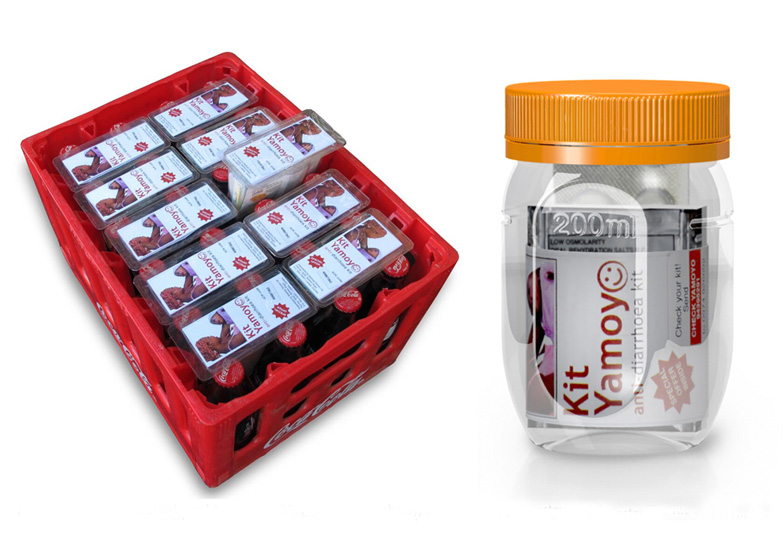News: the inventor of an anti-diarrhoea pack for the developing world has replaced its innovative, award-winning packaging design with a simple screw-top jar.
Kit Yamoyo, an "aidpod" that won plaudits for the way its packaging slotted into the gaps between bottles in a Coca-Cola crate, is being repackaged to reduce costs and increase the number of retailers that stock the product.
"For our supporters who find this move disappointing, I ask you please to keep focussed on the greater good," said social entrepreneur Simon Berry, who announced the move in a blog post yesterday. "Our primary purpose is not to win awards."
Berry, whose ColaLife organisation developed Kit Yamoyo, wrote: "We listen, we learn and we act. What our customers, in poor, remote rural communities are telling us is that many of them cannot afford the subsidised price tag. So the pressure is really on to seek every means to reduce costs."
Despite winning multiple design awards in 2013 including the Design Museum's Product Design of the Year Award and the Observer's Ethical Product of the Year Award, Berry admitted that the novel strategy of distributing the life-saving product alongside Coca-Cola bottles wasn't proving effective.
"Only 8% of retailers have ever put the kits in Coca-Cola crates to carry them to their shops," he wrote. "This feature wasn’t the key enabler we thought it would be."
The kit's plastic blister packaging featured a removable film cover and a contoured container shaped to fit between cola bottles in a standard crate.
Referring to the numerous design accolades the product has garnered, Berry added: "I’d like to think we’d got these awards because of how the components of the Kit Yamoyo product and the packaging work so well together to meet the real needs of caregivers/mothers and children. The way the packaging is integral with the whole kit design, acting as a measure for the water needed to make up the ORS [oral rehydration salts], the mixing device, the storage device and cup.
"But deep down I suspect that it’s the fact that it fits into Coca-Cola crates that really gets the international community so excited. We totally understand this, that was our own starting point and that’s what got us really excited too. Initially."
However Berry has concluded that putting the kit in a standard screw-top plastic jar would make it both cheaper to manufacture and more appealing to both retailers and consumers.
"At this point, the natural thing to do would be to relax and bask in the glory of all of this fabulous recognition of our work on something so meek as an anti-diarrhoea kit," wrote Berry. "We are not designing sexy gadgets or cars after all."
Kit Yamoyo also won this year's Diamond Award at the DuPont Packaging Innovation Awards and an Innovation By Design award in the Social Good category.
The kit contains sachets of oral rehydration salts, zinc, soap and an instruction leaflet, with the packaging doubling as both a measuring device to mix the solution and a cup from which to drink it.
It provides effective treatment for diarrhoea, which kills more children in Africa than HIV, malaria and measles combined. The product has been trialled in poor villages in Zambia, where 25,000 kits have been sold.
Berry admitted in a radio interview last month that he was rethinking his distribution strategy and now feels that the reliance on Coca-Cola distribution has become a hindrance to adoption. "Interestingly, a move in this direction – away from the Coca-Cola crate – may help to make us more interesting to certain parts of the public health world who have seen the current Kit Yamoyo as a niche product that can ONLY be distributed in Coca-Cola crates," he wrote on the ColaLife blog.
"This is not the case – the current Kit Yamoyo doesn’t have to go into Coca-Cola crates – but having a product format that does NOT fit into Coca-Cola crates may make the Kit Yamoyo more appealing to many in the public health sector."
The new screw-top jar is made of preformed PET, which Colalife then adapt using their own mould. The product will continue to be distributed via crates in some markets.

